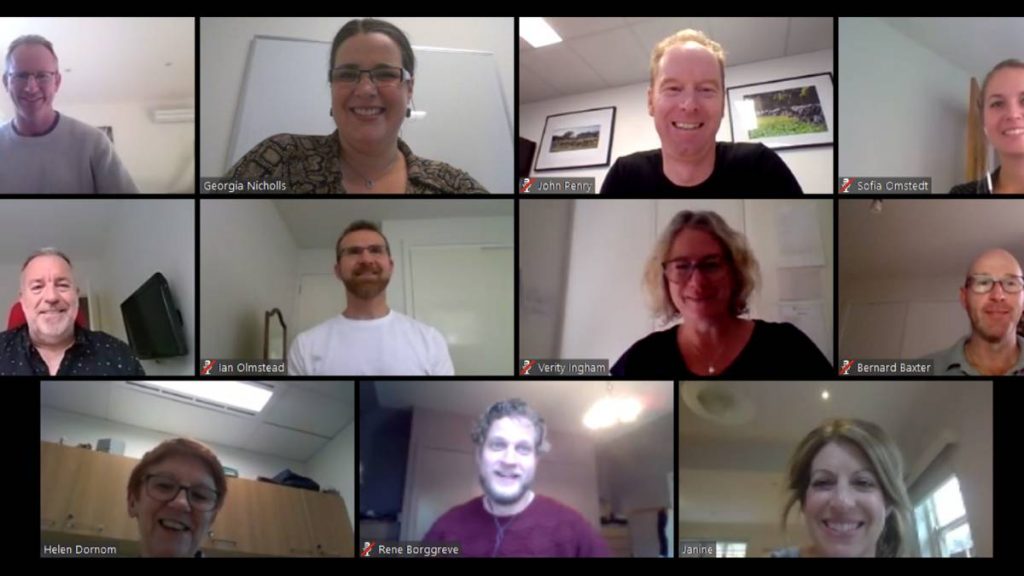
As the situation escalated in the following months, the industry followed its well-tested issues management framework to co-ordinate the response. By mid March, this was ramped up to the highest level with a National Response Group formed to manage the enormous challenges the COVID-19 crisis was creating.
Dairy Australia’s stakeholder relations and issues manager Georgia Nicholls is in charge of co-ordinating that industry response. It’s a big job in an industry that has an extensive farm and manufacturing base across the country.
Part of Ms Nicholls’s normal day-to-day job is monitoring for issues that might have an impact on the industry. This includes a fortnightly meeting with staff from DA, Australian Dairy Farmers and the Australian Dairy Products Federation.
“So fairly early in 2020, we had COVID-19 come onto the list in the industry scan meetings, and we were keeping an eye on things as they were proceeding in China,” she said.
“Our immediate concern was around whether COVID-19 had a direct impact on livestock. It was less apparent at that stage how globally significant this disease was going to be, but it certainly was immediately relevant in terms of dairy export markets, as well as the potential for livestock vulnerability, so that was the initial focus.
“As it became more apparent that there was going to be a much more significant human health impact, and therefore an economic impact, both in our trading markets as well as in Australia itself, we fairly rapidly identified the need to escalate our preparedness to respond.”
Initially two issues teams were formed: one around how DA would continue to operate and service the industry and one around the response and supporting the industry to maintain food production. The second group included a significant number of DA technical staff, as well as ADF and ADPF staff.
“We were meeting every other day initially and talking about how we needed to gear ourselves up for response,” Ms Nicholls said.
When an issue hits this stage two, DA appoints one of its leadership team to lead that issue, to support Ms Nicholls and to bring back issues where DA resources are needed. For COVID-19, DA’s sustainability manager (including food safety and integrity) Helen Dornom was appointed as the lead.
Ms Dornom said as the issues became more encompassing, the co-ordination by Ms Nicholls became more important. “Everyone starts off dealing with particular issues, and after a while many things merge,” she said. “So this role is making sure we’re all dealing with the things we need to deal with and not all falling over each other dealing with the same things.”
The highest level response – the National Response Group – is implemented when the issue becomes critically important for the whole industry. The COVID-19 NRG is chaired by ADF president and Australian Dairy Industry Council chair Terry Richardson and includes ADPF president and ADIC deputy chair Grant Crothers and DA managing director David Nation.
“So they are steering the ship, if you like, and making decisions on behalf of the entire supply chain, where dairy is asked for an opinion or a response or information on behalf of the whole industry,” Ms Nicholls said.
At DA all group managers have been meeting daily to discuss the response and how to marshal its resources to deal with challenges, as well as providing daily briefings to the NRG.
Initial focus
Ms Nicholls said the initial focus for the industry was to ensure the government classified dairy as an essential industry and to show that milk, and food in general, were not part of the transmission process of the virus. “So ensuring first of all we had a safe product in regard to COVID-19,” she said.
The second was to ensure that both the pre-farmgate and post-farmgate sections of the industry could continue to produce the product safely – particularly in how staff could be managed to reduce the risk of transmitting the virus.
The third was dealing with potential labour force challenges.”We are an industry that is very reliant on labour and skilled labour particularly,” Ms Nicholls said. “We knew the vulnerabilities we had across the supply chain for limitations for labour availability were going to be critical, so a number of conversations kicked off early in the piece around that.”
Ms Dornom said one of the challenges was that the situation was changing rapidly, making it difficult to ensure information being provided was accurate.
“Everybody wants an answer today about what it means for their business,” she said. “But you only have to see the change in the messaging from Scott Morrison where that first started and where it is now … so all of us are operating in the ambiguity, trying to get some consistency of message.
“We need to be on safe ground because we are not going to tell you something for it to turn out to be wrong. So the farm team and employment team took a little time to make sure we had some legal advice about how people were interpreting what it might mean, so we could be on safe ground, albeit, we know, shifting ground.”
But once it had the information, the response team moved quickly to put it out, without worrying too much about how it looked or was designed. “We are trying to get stuff up as soon as we feel reasonably comfortable, not waiting to get it all perfect,” Ms Dornom said.
Ms Nicholls tapped into some of the industry’s already established groups to quickly develop tools and resources. For example, a steering committee formed some time ago to develop a milk tanker operator course stepped into the breach to develop pick-up protocols that were going to keep everyone safe.
“But also we have now had to adjust those due to a shortage of PPE (personal protective equipment), particularly gloves and in some cases disinfectant wipes,” she said “There’s been a real sense of urgency to get those adjusted because it has become a real anchor point for industry in terms of offering assurances to the community and their employees and themselves that there is a safe way to continue to conduct business.”
Industry-wide issues
The scope of issues the dairy industry faces is enormous. It’s extensive manufacturing businesses operate in a range of markets, including domestic retail, foodservice and export markets. Some of the smaller manufacturers, such as cheesemakers servicing the restaurant trade, have been particularly hard hit by the COVID-19 closures.
The dairy industry response has included providing information to these manufacturers about how to reorient their businesses, for example to online sales, and how to make use of the various government supports and subsidies available.
The farm sector relies heavily on a range of service providers, from artificial breeding companies to seed companies and contractors to vets.
Ms Dornom said early on the response group developed a list of the various services providers for both the farm and manufacturing sectors, ranking their importance, the need for them to visit workplaces and how often this needed to occur.
When border closures happened, a template was developed from this list for people to be able to use if they needed to get across the border.
Positive response
Ms Nicholls said the dairy industry response to the crisis showed what could be achieved by a united, co-ordinated approach.
“It’s been a really strong demonstration of the output of the industry when we truly work together,” she said. “The collaboration across the three organisations from my point of view has been fantastic and demonstrative of the kind of value of the aims that have been published in Dairy Plan.”
Ms Dornom agreed – pointing to the way in which the industry had organised itself to communicate information quickly to those who needed it. For example, ADPF had opened up its member briefings to any dairy company, including a number of the next tier smaller operators. So, for example, when the Federal Government announced a freight initiative for exporters, people were able to be alerted to it quickly and provided with information about how to use it.
It’s been a really strong demonstration of the output of the industry when we truly work together.
– Georgia Nicholls
Ms Nicholls said the response to the crisis had also prompted DA and the wider industry to become more thoughtful and flexible in the way it delivered information.
“So we’ve had webinars, we’ve had podcasts, we’ve had social media content, we’ve got a number of different forums happening at the regional level in virtual time as well as our website content,” she said.
“And different organisations are offering different opportunities to connect, including weekly teleconferences for the processing side of the industry, weekly teleconferences for the farmer rep organisations, constant liaison with the food safety regulators at the state level on an almost daily basis.
“It all starts to move as a machine quite quickly and to develop some innovative ways of doing things.”
Ms Nicholls said a website directory containing a comprehensive range of resources has recorded thousands of visitors, spending a considerable amount of time navigating and downloading resources. The most popular resources include the COVID-19 guidelines for safely collecting milk, preventing the spread on dairy farms and during milking.
The COVID-19 crisis has also helped the industry hone the issues management framework.
Ms Dornom said Ms Nicholls had introduced a process of putting a quick survey out before a meeting asking for participants to identify key issues.
“So the meeting can be more efficient – rather than going around the table and getting issues out,” she said. “Then Georgia feeds that into the brief that we do and we make sure it gets to the right people that are taking responsibility for certain issues or those people are on the phone and starting to work on them.”
Ms Nicholls said this meant the work plan of the rapid response team was industry led. “The input we are getting from all those sources really becomes the kind of plan of attack for the next 24 hours,” she said.
Future focus
Ms Nicholls said several issues were appearing on the horizon as the COVID-19 crisis continued to unfold.
Mental health was top of the list. “Dairy businesses tend to be quite connected by their very nature and having to put in place processes that make staff much less connected in their day-to-day operations and the challenges associated with it,” she said. “So we are fairly aware that on the horizon there will be a role for us to play as a response team in terms of supporting mental health across industry.”
Ms Dornom said DA’s regional development program teams would start the process of ringing around farmers in their areas, something that had worked well in the industry responses to bushfire and floods. “That’s why it is good having that central manager role because you can learn from all the past experience and bring it to play,” she said.
Ms Nicholls said the ongoing impact on manufacturers in the foodservice sector would continue to emerge across coming months.
“The other thing is making sure we are constantly vigilant in talking about the workforce implications because that will obviously, depending on the rate of infection and how that either accelerates or continues to slow, really determine the level of impact on the major part of the industry,” she said.
So the response team was talking with the Federal Government and its agencies such as Centrelink and the Department of Foreign Affairs and Trade about trying to tap into the pool of people who were seeking work.
“Where we might have the opportunity to draw them into the industry either temporarily to plug holes on farm or in factories where there are people who are ill or in a more sustained way drawing them in and demonstrating to them how dairy is a great industry to be part of,” she said.
Ms Dornom said this was being supported through the development of resources such as an online training course giving a quick introduction to milking that could be used by an inexperienced new or temporary staff member.

























